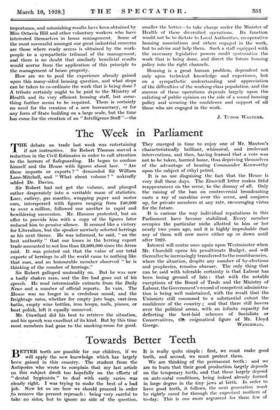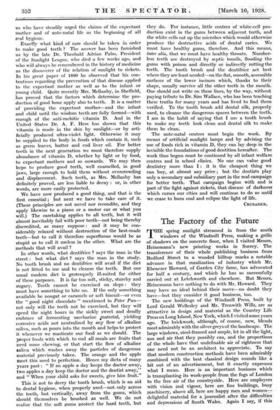Towards Better Teeth
BETTER teeth are possible for our children, if we will apply the new knowledge which has largely been gained in this country. The student from the Antipodes who wrote to complain that my last, article on this subject dwelt too hopefully on the efforts of " dental hygienists " to deal with early caries was clearly right. I was trying to make the best of a bad lob. Now let us see how we should proceed in . order ito. remove the present reproach : being very careful to take .no sides, but . to ignore no side of the question. It is really quite simple : first, we must make good teeth, and second, we must protect them.
We are thinking of the permanent teeth : and we are to learn that their good production largely depends on the temporary teeth, and that these largely depend on ante-natal conditions, being indeed already formed in large degree in the tiny jaws at birth. In order to have good teeth, it follows, the next generation must he rightly cared for through the expectant mothers of to-day. This is one more argument for those few of us who have steadily urged the claims of the expectant Mother and of ante-natal life as the beginning of all real hygiene.
Exactly what kind of care should be taken in order to make good teeth ? The answer has been furnished us by the late Dr. Theobald Adrian Palm, President of the Sunlight League, who died a few weeks ago, and who will always be remembered in the history of medicine as the discoverer of the relation of sunlight to rickets. In his great paper of 1890 he observed that his con- tentions regarding the prevention of that disease applied to the expectant mother as well as to the infant or young child. Quite recently Mrs. Mellanby, in Sheffield, has proved that the factors which determine the pro- duction of good bone apply also to teeth. It is a matter of providing the expectant mother--and the infant and child until the wisdom teeth are fully formed—with enough of the anti-rachitic vitamin D. And in the United States Dr. A. F. Hess has shown that this vitamin is made in the skin by sunlight—or by arti- ficially produced ultra-violet light. Otherwise it may be supplied to the body in foods which contain it, such as green leaves, butter and cod liver oil. For better teeth in the next generation we must therefore supply abundance of vitamin D, whether by light or by food, to expectant mothers and so onwards. We may then hope to produce good teeth, well enamelled, in good jaws, large enough to hold them without overcrowding and displacement. Such teeth, as Mrs. Mellanby has definitely proved, are less liable to decay : or, in other words, are more easily protected.
We have now produced a good thing, and that is the first essential ; but next we have to take care of it (These principles are not novel nor recondite, and they apply likewise to a piano or a motor car or what you wilL) The caretaking applies to all teeth, but it will almost inevitably fail with poor teeth—not being thereby discredited, as many suppose : and it may be con- siderably relaxed without destruction of the best-made teeth—but to call it therefore superfluous would be as stupid as to call it useless in the other. What are the methods that will avail ?
In other words, what dentifrice ? says the man in the street : but what diet ? says the man in the study. No tooth brush and no dentifrice will avail if the diet Is not fitted to use and to cleanse the teeth. But our usual modern diet is grotesquely ill-suited for either of these purposes. It is far too soft, sticky, starchy and sugary. Teeth cannot be exercised on slops : they must have something to bite on. If the only something available be nougat or caramels or soft biscuit—or even the " good night chocolate " mentioned in Peter Pan— not only will the teeth not be exercised, but they will spend the night hours in the sickly sweet and deadly embrace of fermenting saccharine jnaterial, yielding corrosive acids not neutralized by any flow of alkaline saliva, such as pours into the mouth and helps to protect it whenever we masticate our food as we should. The proper foods with which to end all meals are fruits that need some chewing, or that start the flow of alkaline saliva which washes away the particles of dangerous material previously taken. The orange and the apple meet this need to perfection. Hence my dicta of many years past : " If an apple a day keeps the doctor_ away, two apples .a day keep the doctor and the dentist away," and " When your child asks for sweets, give him fruit."
This is not to decry the tooth brush, which is an aid to dental hygiene, when properly used—not only across the teeth, but vertically, away from the gums, which should themselves .be brushed as well. We do, not realize that the soft sums protect the hard teeth, but they do. For instance, little centres of white-cell pro- duction exist in the gums between adjacent teeth, and the white cells eat up the microbes which would otherwise produce the destructive acids of dental caries. We must have healthy gums, therefore. And this means, inter alia, that we must have healthy throats. Number- less teeth are destroyed by septic tonsils, flooding the gums with poison and directly or indirectly rotting the teeth. The tooth brush and the dentifrice act best where they are least needed—on the flat, smooth, accessible surfaces of the lower incisors which, thanks to their shape, usually survive all the other teeth in the mouth. One should not write on these lines, by the way, without paying tribute to Dr..Sim Wallace, who has been teaching these truths for many years and has lived to find them verified. To the tooth brush add dental silk, properly used, to cleanse the dangerous spaces between the teeth. I am in the habit of saying that I use a tooth brush to make my teeth look clean and dental silk to make them be clean.
The ante-natal centres must begin the work. By means of artificial sunlight lamps and by advising the use of foods rich in vitamin D, they can lay ,deep in the invisible the foundations of good dentition hereafter. The work thus begun must be continued by all infant welfare centres and in school clinics. No one can value good dentistry more than I : it is the cheapest thing we can buy, at almost any .price ; but. the dentists play only a secondary and subsidiary part in the real campaign for better teeth. That campaign begins with and is part of the fight against rickets, that disease of darkness which curses our cities and will continue to do so until we cease to burn coal and eclipse the light of life.
CRUSADER.



























































 Previous page
Previous page